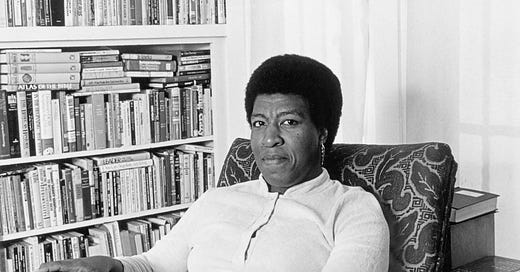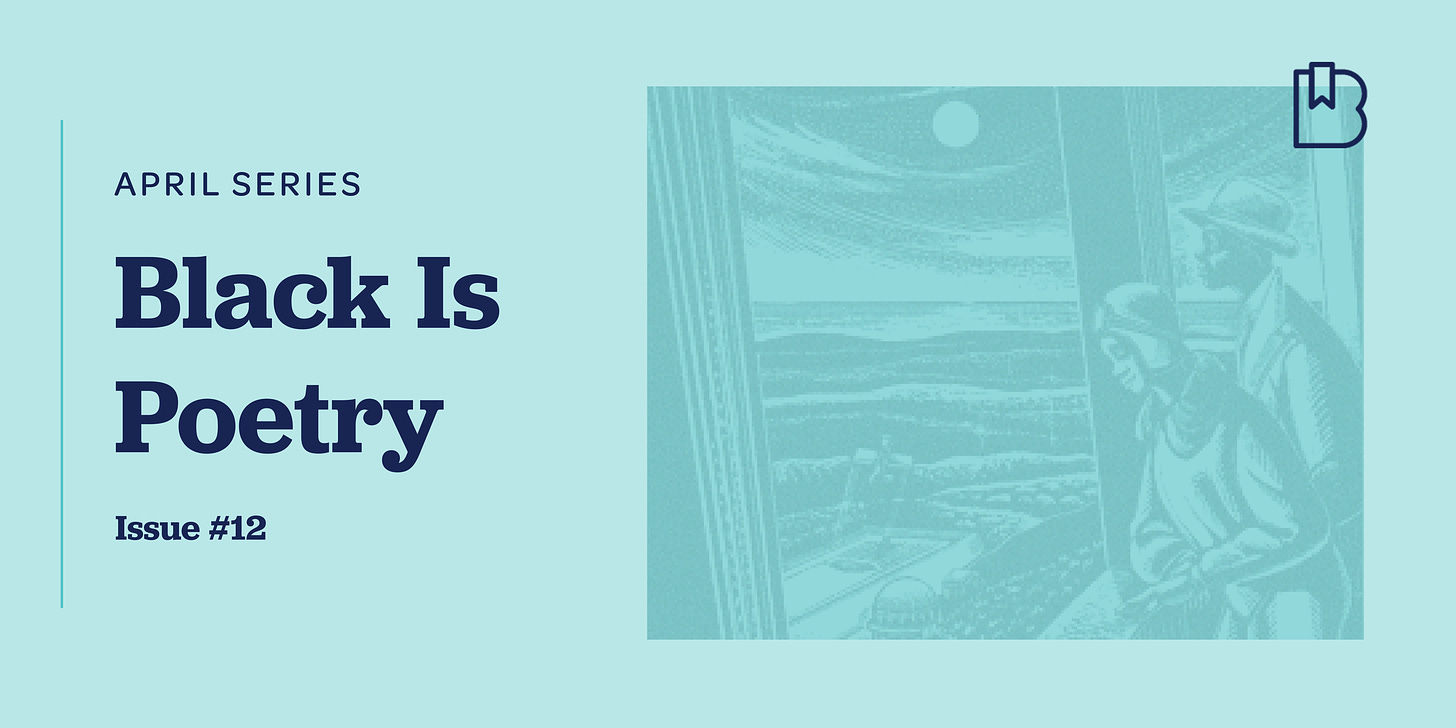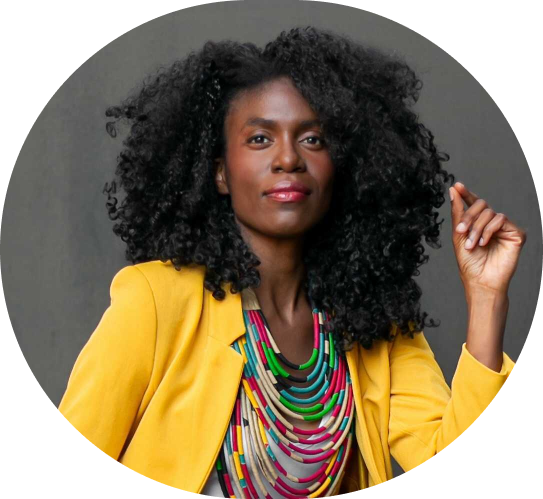Black Is Poetry
Welcome to issue #12! 📜
Black To School celebrates Black people and Black contributions around the world. The “Why?” that powers our mission is simple. “Our ancestors invented the table that the world now sits at. It’s time to not just claim our seat, but to set the agenda.” Please click on this link and learn more about the backstory behind Black To School.
This is the final Black Is Poetry themed issue. Boy, did we get an earful in response to last week’s Hip Hop is Poetry piece! We were reminded of just how important it is for the Black community to have “master curators” who broaden the scope of the lens from which human history is observed and recorded.
A special thanks 🙏🏾 to the readers below who were our “Golden Griots'' (or top sharers) last week. Please keep sharing stories of #blackcontributions and our collective history within your networks!
Janet D.
Lee H.
Andrene S.
Nikki S.
Pamela W.
In this issue, we’ll:
Delve into a form of Black literature and artistic expression that is powered by science and technology, Afrofuturism.
Bend your mind and time as we explore visions of the new world order. Reflect on what you most value about the past and what you want to be true about our collective future.
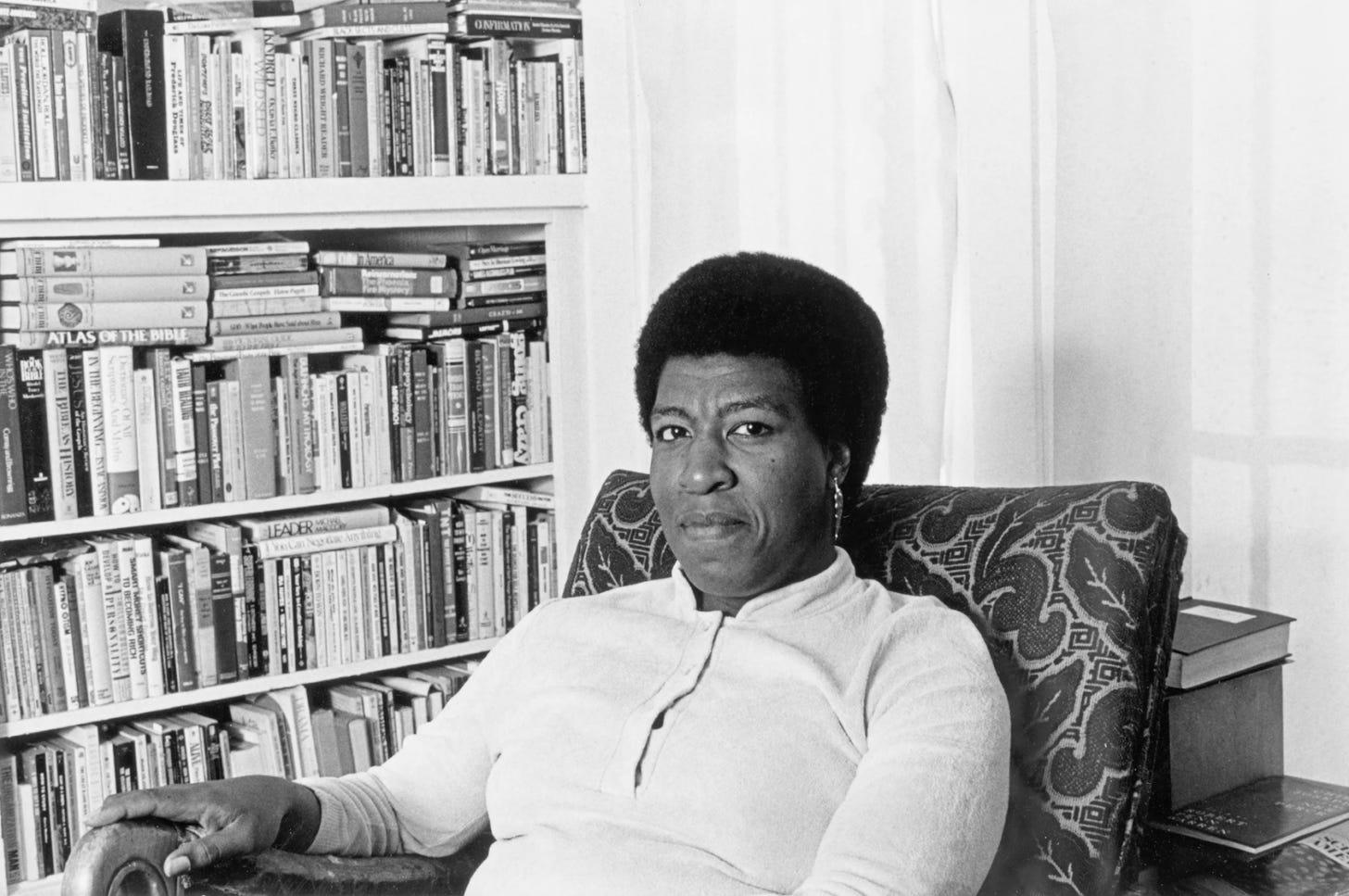
Black To The Future
Contributor: Fri Forjindam
“Where we’re going, we don’t need roads!” - quite possibly one of the most iconic lines uttered in a cinematic depiction of the future for anyone coming of age in the late 1900s. And although today, that time period seems like a snapshot out of the Victorian era, it was in fact the the post-Reagan era, where young kids of all races looked to MTV, record contraband, comic book stores and movie theatre to give them a blueprint of the future.
Those iconic words were spoken so matter-of-factly by Doc Brown, the hoary physicist played by Christopher Lloyd, to his doting apprentice named Marty, played skillfully by Michael J. Fox. The era from which they fled was the 80s, and their destination? The Future! However, the sad reality is that their future had some very glaring omissions.
Anyone who remembers the space-age cartoon, The Jetsons, or has watched any movie in the, Star Wars franchise, or read the book, A Hand Maid’s Tale, might wonder, where are all the Black people and where does our past fit into the future? Could Lando (up until the arrival of FN-2187 “Finn” decades later) honestly be the only brother in the entire galaxy?
Writing and art that focuses on the future and alternate realities is typically characterized as science-fiction (a genre of speculative fiction). Science fiction (Sci-Fi) explores aspirational (or cautionary) visions of the future or the present that contemplate technological advancements, social and environmental changes, as well as alternative forms of work and life. There is evidence of Black science fiction writing in America as far back as the early 19th century and African science fiction also has a long, distinguished history.
Here’s the thing though, the practice of imagining other worlds in the future or here and now, is neither limited to science fiction literature nor the literary arts as a whole. The interdisciplinary field of Futurism is a better way to classify this form of artistic expression. Futurism as a movement was born in Italy, promoted by young visual artists and musicians, who were obsessed with all things modern and technology-enabled. In pursuit of cultural progress, they rejected the past in favor of speed and the trappings of modern life.
Afrofuturism, although similar in name, is markedly different from Futurism in theory, practice, and origin. Afrofuturism exalts our ancestral roots, values, and traditions. Scholars have described it as a “way of looking at the future and alternate realities through a Black cultural lens.” Afrofuturism is a dimension from which poets, musicians, artists, philosophers, designers, and intellectuals both celebrate and emancipate our history and imaginations.
It is a spectrum of narratives that circle the complexities and subtleties of humanity with the African diaspora at the center. Afrofuturism is the permission to adopt a more reflective, imaginative form of code switching where the end result isn’t a need to assimilate into an adopted mainstream, but in fact, a mandate to carve a bold new reality. Afrofuturism is revolutionary!
Where’s the magic in Afrofuturism?
Afrofuturism existed long before it had a name. The African American authors, artists, and musicians who gave birth to it often speak of being heavily influenced by African mystical traditions (jujuism), philosophy, cosmology, technology, art, architecture, beauty, and culture. Authors like W. E.B. Dubois, Pauline Hopkins, George Schuyler, and poet-musicians like Sun Ra were among the first Black artists on the scene to infuse science and technology into imaginary worlds in which Black heroes shaped the full narrative.
Those Black imagineers were a huge source of inspiration for the next generation, Octavia Butler (a.k.a. mother of afrofuturism), Samuel Delaney, poet-musician-graffiti artist, Jean-Michel Basquiat, and funk musician, George Clinton, who are credited with evolving the field from a movement to a genre. It was their avant-garde work that led author, Mark Dery, in 1994, to publish the essay “Black to the Future” in which he interviewed Black content creators and asked a foundational question that is often cited as a rallying cry for Afrofuturism.
“Can a community whose past has been deliberately rubbed out, and whose energies have subsequently been consumed by the search for legible traces of its history, imagine possible futures? Furthermore, isn’t the unreal estate of the future already owned by the technocrats, futurologists, streamliners, and set designers ― white to a man ― who have engineered our collective fantasies?” - Mark Dery
What is so powerful about this genre is that it lives entirely outside of Western (and any outside) influence. Black people are the heroes and heroines in the future (or in alternate realities). In most cases, the stories are of a utopia or dystopia intended to right old wrongs or serve as a cautionary tale for unchecked societal issues. In the end, it is a fantasy world that returns to and normalizes ancient African truths - existence of nonlinear time, appreciation for the divine feminine, primacy of community, symbiosis with nature, reverence for mysticism and ingenuity.
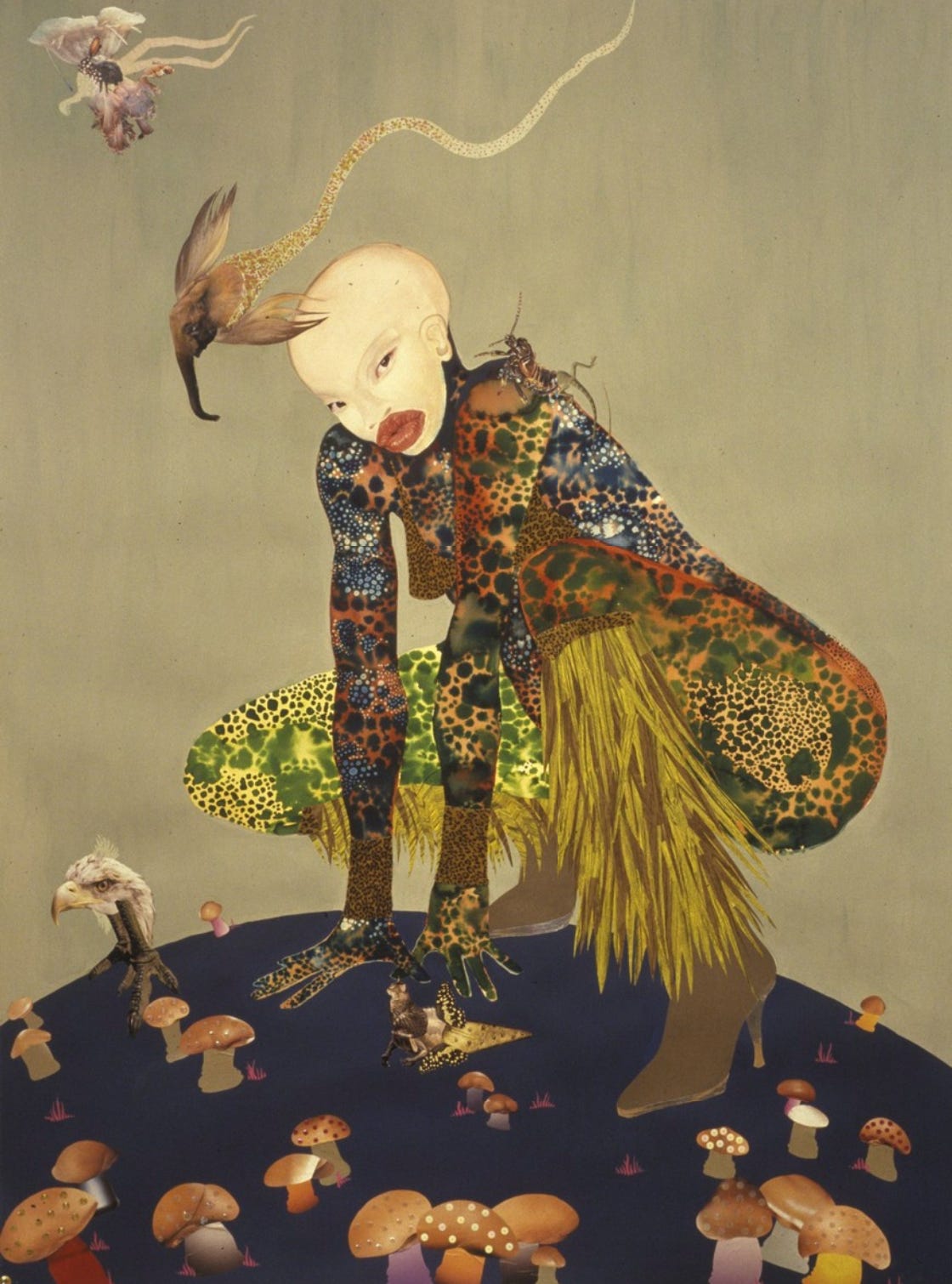
So Be It! See To It!
Afrofuturism transitioned from niche to mainstream starting with the dawn of mythical vampiric realms in Blade. Then years later with the blockbuster release of Black Panther, which broke Box Office records, took home three Academy Awards (the first ever for Marvel Studios), and is the 10th highest grossing film of all time with $1.3 Billion gross revenues. Afrofuturism now has a MacArthur Genius award winner and a Basquiat that sold for $110 Million.
There are more prolific writers like N.K. Jemison, Nnedi Okorafor (with her special brand of Africanfuturism) and Tomi Adeyemi who have joined the field. And scholars like Alondra Nelson who is a Biden administration appointee, Grammy award winners like Janelle Monae and Pharrell as well as filmmakers, activists, fashion designers, and architects are evolving the global canon in a variety of fields.
Our future is in great hands. The Black poets, writers, and artists that are shaping our narrative today are helping to tell the story of who we are, what cultural gifts we carry, and where we are going. They are unapologetically aspirational. They are celebrating anything and anyone that sees that Black creativity is key in the great race to save humanity. They are paving a new future that not only doesn’t need roads, but dares to dream in culture.
🛠️ The Black To School Toolkit
Now What? Dig Deeper with Friends, Family, and Others.
Want to learn more about Afrofuturism? Click here to watch this entertaining 20-minute TED Talk. Want more? Read this primer, Afro-Futurism: The World of Black Sci-Fi & Fantasy Culture, which explores the genre’s music, literature, and art.
Curious about the who, what, & when? Checkout this timeline of Afrofuturist authors, books, philosophy, and movies from 1859 to 2018.
Wondering how to best share with your kids? Watch this PBS video (10-min) that breaks it down really well for young people (Grade 5 through 12). And choose from this awesome selection of children’s books for toddlers to teens.
Are you a #fangirl or #fanboy of Octavia Butler? Join the club! Enjoy this exhibit with a collection curated by The Huntington of over 8,000 items, including some of her unpublished work.
Excited to join the conversation? Keep an eye out for the next annual AfroPunk Festival and engage in this Afrofuturism Reddit group. More of an observer? Tune into this Afrofuturist podcast.
Let’s look ahead and think different! Buy and read Hugo Award winning author, N.K. Jemison’s, “How Long ‘Til Black Futures Month?”. Bend your mind (just a little) and visit the literary and artist collective, Black Quantum Futurism.
⌛ The Black To School Timeline
Black Creativity is Key in the Great Race to Save Humanity
We began by stepping into Prehistoric times (At least 5,000 Years Ago) The Thing: Sumerian and Nsibidi, the first written language systems, created by Black Africans in Mesopotamia.
Followed by zooming into the 20th Century (100 Years Ago) The Place: Harlem (Renaissance), a community of writers and activists that inspired one of the greatest artistic, cultural, and intellectual movements.
Then we turned the spotlight on the 1970s (50 Years Ago) The Practice: Hip Hop, the lyrical genius that sits at the intersection of poetry, philosophy, and performance art.
Finally, we returned to here and now (Present Day) The Promise: Afrofuturism, the freethinkers who use artistic expression and technology to create a powerful vision for society and the planet.
About This Week’s Contributor
Fri Forjindam
Fri Forjindam is the Chief Development Officer and Executive Creative Director for Mycotoo, Inc, a global leader in themed entertainment, live events and immersive brand experiences. Mycotoo specializes in entertainment strategy, master planning, design, development and production.
Voted “Top Media” company by Inc. 500, Mycotoo operates in North America and Europe, with iconic collaborations worldwide including Prince’s Paisley Park, Bollywood Parks and Motiongate Theme Park, and award-winning brand experiences like HBO's SxSWestworld, Bleed For The Throne and Netflix’s The Irishman Little Italy Takeover.
In her role, Fri focuses on driving business development, branding and communications across Mycotoo’s growing global network. She has been featured in Fast Company Magazine, Essence, Minted.com, KTLA, FOX and was awarded the "Top 50 Theme Park Influencer" distinction in 2018 and 2020 by Blooloop Magazine. Mycotoo was awarded Top Prizes for Clio and Cannes Lions Gold for SXSWestworld.

